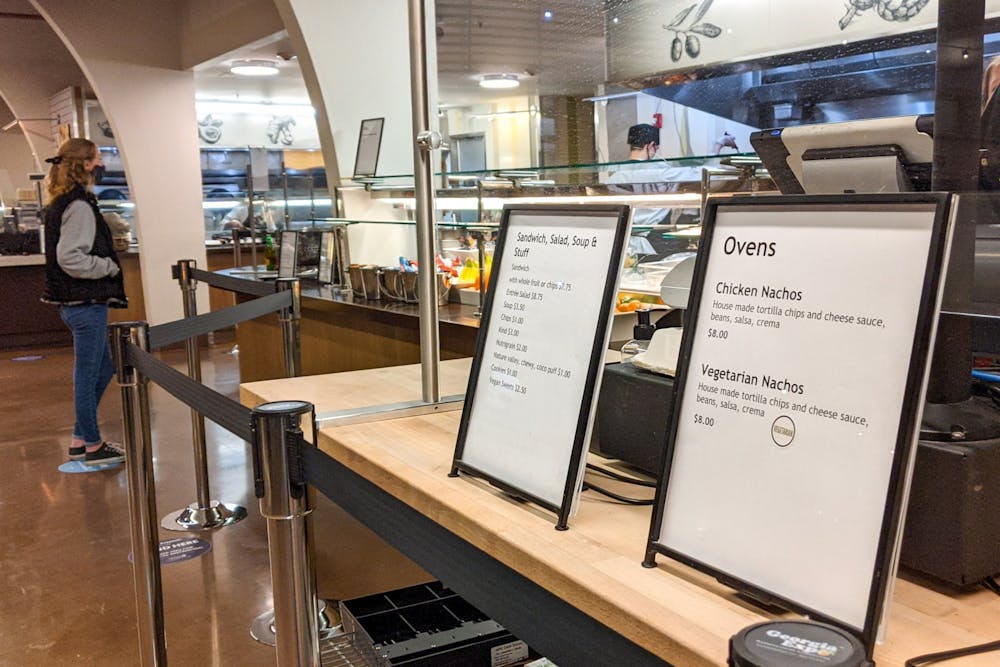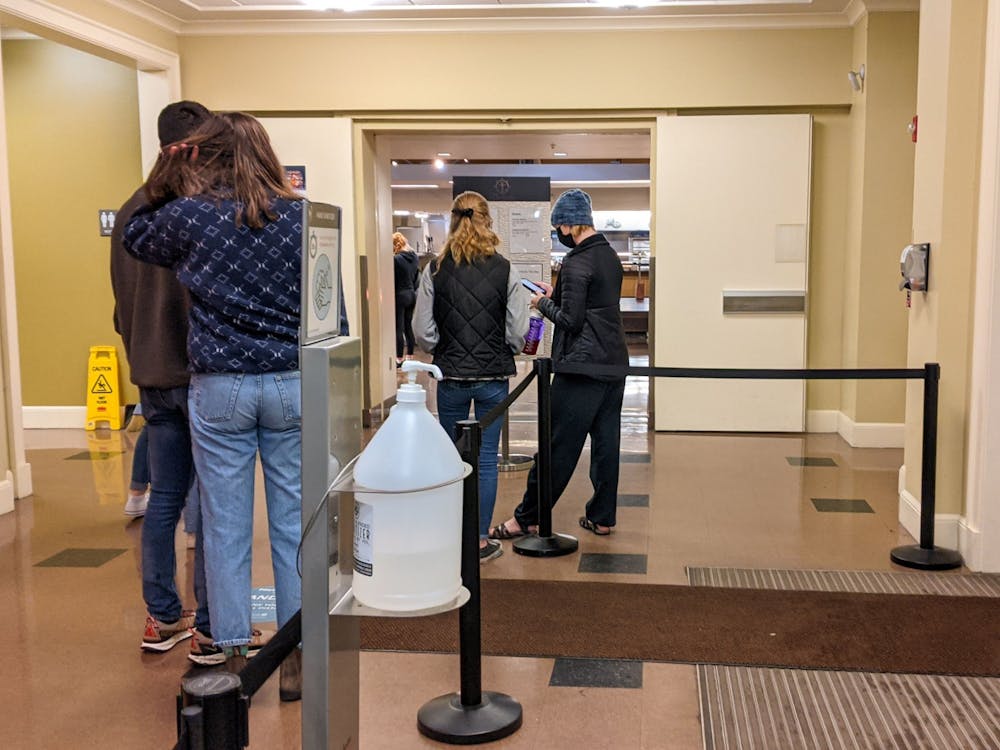Without a car or an excess of disposable income to spend on Doordash, Uber Eats, or Postmates, students living near or on the UP campus have become all too familiar with The Commons menu choices. Many have also become frustrated with The Commons, complaining of carelessness when it comes to allergies, insects found in meals and alleged food poisoning.
Students have complained on Instagram and to ASUP Senators and The Beacon about their negative experiences this semester.
General manager of Bon Appetit, Kirk Mustain, told The Beacon he is listening and appreciates the feedback.
Students concerned about food allergies, lack of nutritional labeling at The Commons
Claire Lang is a freshman living on campus with celiac disease, an autoimmune disorder that causes an allergy to gluten. Like others living with celiac, ingesting even the smallest bit of gluten could send Lang to the hospital.
Lang told The Beacon about several instances that suggest the staff at The Commons needs to be more sensitive to the needs of students with allergies.
“It's been very frustrating,” Lang said. “My allergies are pretty severe, so it's really hard for me to feel safe eating there.”
Although The Commons posts signs to show what foods are or can be made gluten-free, Lang says the signage has not reflected her actual experience. In one example, Lang recounted an incident where she was given just a box of marinara sauce and a piece of normal bread after ordering gluten-free pasta.
“You’re giving me something that could literally hospitalize me and you're giving me just a box of marinara sauce that has zero flavor.” Lang said.
But this was not the first time.
“Multiple times I’ve been given a piece of bread that definitely has gluten in it,” Lang said. “When I'm ordering something, when I'm saying ‘Hey, I have celiac disease, I need this to be gluten free’ and you put a piece of gluten bread in it, it's like, are you even listening?”
For people with celiac disease, eating food that has even come in contact with gluten can be dangerous. For example, a spoon used to serve food containing gluten should not be used to serve gluten-free foods. This potential for cross contamination or a mistake in an order causes stress for those with severe allergies.
Because of her experiences, Lang has trouble trusting the food at The Common. She has been told by Commons’ staff to advocate for herself and her allergies.
“I've definitely tried to advocate for myself,” said Lang. “Because that's a really important part of having allergies and any dietary restrictions at all.”
However, she also acknowledges she doesn’t always have the time or energy to explain her allergies before every meal.
“I've ended up just making most of my food myself,” Lang said. “It's too hard to spend 20 minutes every time talking them through, it's like every time I eat I'm like, ‘is this gonna make me really ill? I don't know.’”
Lang represents a significant population on campus; she is not alone in having an intolerance or allergy to a specific type of food. Research suggests that 32 million people, or 10% of adults, in the United States alone have a food-based allergy.
Executive Chef at the Commons James Green says the Commons is doing the best they can to protect students with intolerances.
“We've had to really magnify our efforts on making sure we can meet student’s needs,” Green said. “Eliminating cross contamination when and where we can, eliminating mistakes in orders.”
Green recommends students with concerns about allergies and intolerances speak with Bon Appetit workers.
“I encourage students to talk directly with staff, and I know that that's hard, but we take it seriously,” Green said. “And we talk about and come up with different ways to be able to deliver items in a healthy and safe and reliable manner, it's been a constant conversation that we needed to have.”
On its website, Bon Appetit gives tips on how to be safe when living with a food allergy or intolerance.
“Know what you’re eating and drinking by reading food labels of packaged foods,” the website says. “It’s not enough to read the label once – double check it every time you purchase a product.”
However, this is easier said than done, as the Commons does not provide food labeling on their meals, and they are not required to. According to FDA Regulations, school cafeterias are exempt from requiring nutritional labels on their foods.
Outside of allergies and intolerances, other medical conditions like diabetes and kidney disease can be made easier with the help of nutrition labels. For diabetics, knowing the grams of carbohydrates in a meal helps them administer the correct dosage of insulin, and those with kidney disease can use nutrition information to monitor their sodium intake. For conditions like these, a lack of nutrition information becomes a guessing game to support one’s health.
According to Mustain, the company's reason for not providing nutritional information is that the meals at the Commons are always changing.
“We can't correctly state what's on there and unfortunately, in this day and age, you really need to be exact.” Mustain said. “It's easier for us not to put anything on there than to falsify any kind of information.”
Insects found in food recently
Over the course of the semester, some students have documented finding insects in their meals served at The Commons. According to Mustain, a lack of pesticides on produce from local farms is the reason for bugs being found in the food.
“The produce would come in, I don't know, six hours before then,” said Mustain. “Right off the farm six miles from here, and they don't use herbicides, they don't use pesticides, and a bug’s job is to stay hidden and hold on.”
The Commons staff has been working to combat this issue by changing their washing practices.
“We've taken it out of the sinks and into the big 120 gallon kettles,” Mustain said. “Use twice the amount of water, smaller groups, really agitate those, and then also do a secondary inspection and look at what's at the bottom of the bowl.”
The Instagram account @upfoodreviews showed images of three different bugs reportedly found in Commons meals, a ladybug and what appears to be a squash bug on the salads, and what Mustain identified as a caterpillar in one of the entrées.
Several students complain of food poisoning
Additionally, some students have reported getting food poisoning this term after eating at The Commons. Associated Students of the University of Portland (ASUP) Freshman Senator Miguel Navaro has heard from some of them.
“A lot of my constituents have reported to me about the state of the Commons food,” Navaro said. “I remember when it first started, it came like one by one, and I was like, ‘Okay, we have to address this, this isn't just a coincidence.’”
When asked about these reports, Mustain urged students to turn to him rather than their senators if they feel ill after a Commons meal.
“I hear those things, but none of them have formally been brought to me,” Mustain said. “It's a lot of hearsay, and one of the things I realized is that I can't react to third party incidents. I need people to either go to the Health Center, get documented, or come see me directly so we can go back and trace the meals. ”
The Beacon has been unable to confirm the reliability of the claims.
Food poisoning can be difficult to prove conclusively without a medical evaluation, and upon reaching out, students who said they had food poisoning declined to go on the record with The Beacon. Regardless, Mustain pushed against the claims of food poisoning, providing alternative reasons for some students feeling ill on campus.
“There's a whole series of things that are going on right now,” Mustain said. “Maybe it's a food intolerance that they didn't know about, could be something along those lines. Could be anxiety, there's a lot of pressure on you guys right now. Even though we're in the midst of COVID and everybody's wearing masks, colds are still out there, the flu is still out there, people forget that people can still get sick.”
Challenges of the pandemic and moving forward
Feeding hundreds of students during a worldwide pandemic is no easy feat, and Bon Appetit frontline workers have had to deal with many challenges: a mass layoff in September, being called back to work, having to follow additional safety protocols and putting themselves at personal risk just by being at work.
“This past 12 months has been an exceptionally challenging time for all the staff in the kitchen.” said Green.
Despite the challenges, both Green and Mustain have committed to helping students with their complaints.
“We're a service oriented group here,” Mustain said. “And we want to make sure we're providing the best product we can and keep everybody safe.”
With even more students returning to live and attend in-person classes on campus next semester, there is hope for a more normal experience with on campus dining.
“It's just a weird year for us, so we are really trying to make the best of it right now.” Mustain said. “And looking forward to fall, all indications look towards us operating semi-normally, people actually in house dining and having both of our operations open and having more population on campus.”
Kate Cuadrado is a reporter for The Beacon. She can be reached at cuadrado24@up.edu.








